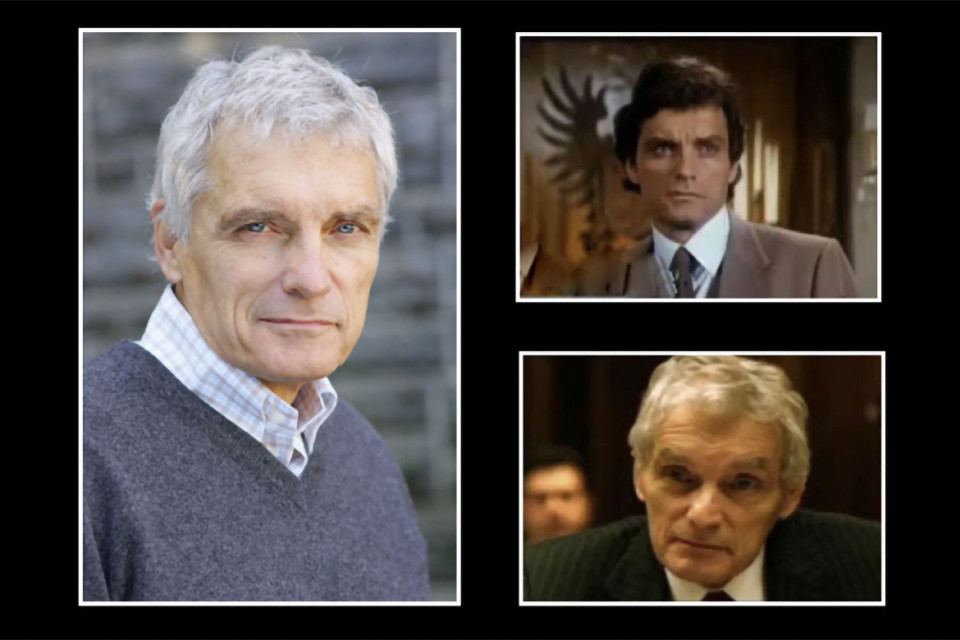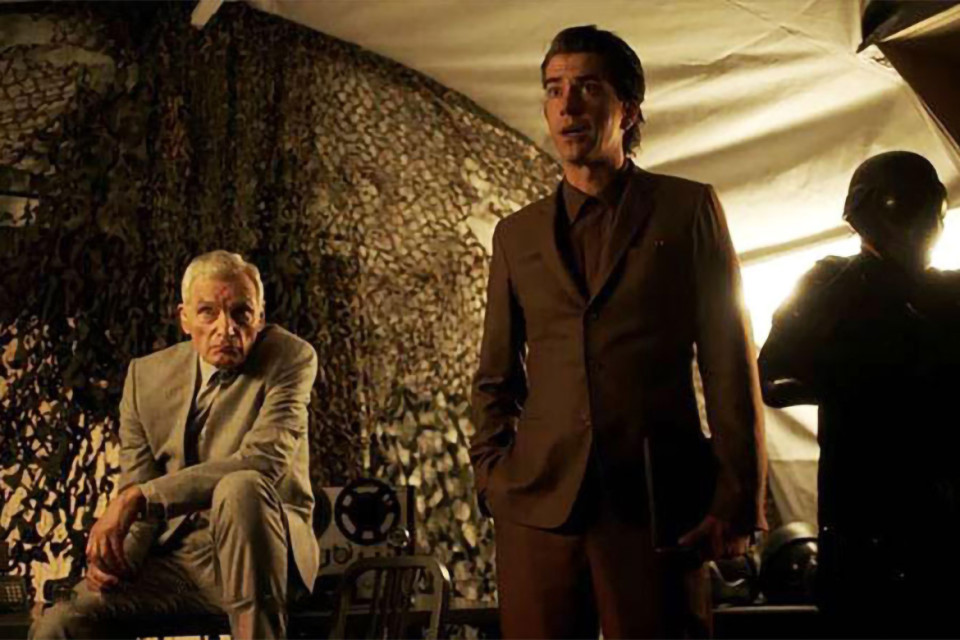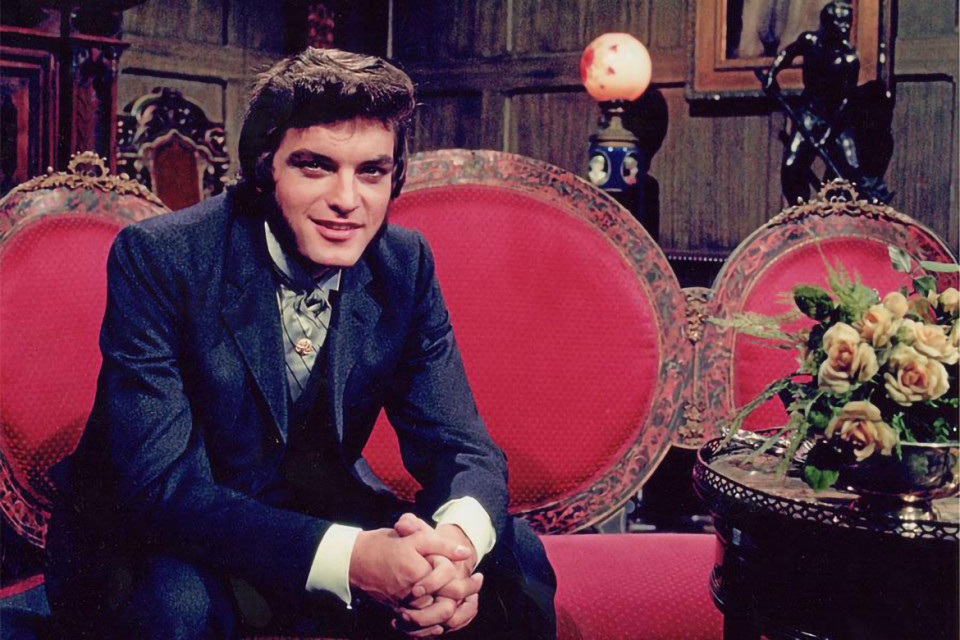David Selby is a tireless actor.
Compelled to work, he combines graciousness with skill and, in the process, colleagues become friends, and his audience becomes fans.
Born and raised in Morgantown, West Virginia, the Shakespearean-trained thespian earned a B.S. and an M.A. degree from West Virginia University and a Ph.D. from Southern Illinois University. He went on to make an indelible mark in television as the mysterious Quentin Collins on the groundbreaking daytime gothic serial, Dark Shadows (ABC, 1966–1971) and as the cunning Richard Channing in the prime-time classic, Falcon Crest (CBS, 1981–1990).
Such benchmark roles paved the path for a prolific career that continues to thrive on film, the stage, and TV, where he's recently guest-starred on hit shows like CBS's NCIS New Orleans, and NBC's Chicago Fire, following a regular role on the heralded F/X sci-fi series, Legion.
But Selby's television playlist, in particular, has always impressed.
In 1977, he was Roger Castle in the ABC mini-series Washington: Behind Closed Doors, the first such multi-part programming event to follow the historic format ignited by the original Roots (which debuted on ABC that same year). In 1988, he took the true-story lead in the syndicated King of the Olympics: The Lives and Loves of Avery Brundage.
In 1992, he appeared in TV-movies like ABC's Lady Boss, based on the Jackie Collins novel of the same name, and CBS's Grave Secrets: The Legacy of Hilltop Drive with Patty Duke. From 1997 to 1999, he had a regular role on the syndicated series, Soldier of Fortune. And then there are those countless guest-spots on '70s crime-dramas favorites like NBC's Police Woman, starring Angie Dickinson, and CBS's Kojak with Telly Savalas, which was shot in New York.
Selby's memories of each are as similar as they are different. He recalls Jackie Collins as "terrific," Duke as "darling," and Dickinson as "lovely to work with. A class act." Savalas, however, had his own elusive brand of "Who loves ya', Baby" lollipop-charm, and subsequently remained unavailable for any close-ups. "I did those with his stand-in or to a post," Selby recalls with a smile.
But not a stand-in or post was in sight when, in 1974, Selby made his TV debut with a guest appearance on CBS's The Waltons, a family show set in the 1930s Depression-era mountain countryside of Virginia.
In a daring episode titled, "The Romance," which proved both intriguing in plot and fortuitous for his career, Selby played Joshua Williams, an artist/teacher who attempts to woo a new student: the money-poor, but noble-rich matriarch Olivia Walton portrayed by the Emmy-winning Michael Learned.
Says Selby: "My character at the time was the only one to kiss Olivia Walton besides her husband [John, played by the Emmy-winning Ralph Waite].
It was a creatively provocative and professionally unique role for Selby to play, and he credits Waltons creator Earl Hamner and producer Robert L. Jacks, for the "wonderful" opportunity.
As a result of The Waltons "Romance," Selby was cast as a series regular, Michael Tyrone, on NBC's beloved if short-lived Flamingo Road. Created by Rita Lakin, Flamingo ran only one season, but allowed Selby the chance to befriend another "remarkable group of actors." This time, his co-stars included Howard Duff, Morgan Fairchild, Kevin McCarthy, Mark Harmon, and Peter Donat, then married to Michael Learned.
Selby remembers them all as "well-established and respected members of the artistic community."
Like The Waltons, the setting for Flamingo Road was Southern bucolic, if based some 40 years later in the then-contemporary late '70s. And while both series hailed from the winning stable of Lorimar Productions, founded in 1969 by former realtor Merv Adelson, Lee Rich, and Irwin Molasky, it was NBC's Road which led Selby his portrayal of Richard Channing on CBS's Falcon Crest.
This popular prime-time soap opera, set in the fictional Falcon Crest Winery of California, was another relatively-rural-premised Lorimar production created by Hamner. Due to the success of yet another CBS/Lorimar nighttime-country-soap hybrid called Dallas (created by David Jacobs), the "Eye" network's early '70s edict to expunge "every show with a tree in it," became an altered reality.
Into this remix, Falcon Crest, originally envisioned within a stand-alone, non-arc hour-long premise, subsequently switched to its serial format and lasted nine seasons.
"Falcon Crest ran longer than I ever imagined," Selby says. "We shot so many episodes a year, sometimes filming at least 30 to 32 a season. Each took seven or eight days to shoot, and there was little time off. But every summer, we go up to Napa Valley and film exterior locations for the first 12 episodes or so. And then we'd return to Los Angeles and the studio and finish up all the interior shots for the entire season."
Falcon Crest allowed Selby to establish lasting friendships with still another large, stellar cast, including Susan Sullivan, Robert Foxworth, and the show's legendary female lead, Jane Wyman (who passed away in 2007). Selby and the veteran actress, once married to future/former President Ronald Reagan, formed a particularly strong bond, ironically so, as she played his character's estranged mother, Angela Channing.
"Jane Wyman was a dear friend," he says. For those annual location shoots to Napa, "We would stay at the same hotel, with our rooms next door to each other. And sometimes, after filming, Jane and I, and a lovely actor named Bob Curtis, who played Father Bob on the show — and who Jane adored…we would all have dinner and share a glass of wine."
"Jane was fantastic," Selby says of Wyman, who would regale him with earnest stories of, among others, her life with Reagan. "You know," she would tell him, "… people think that Ron and I don't get along. But in fact, we do."
"She was just the best," says Selby, who feels the same way toward his time on Falcon Crest in general. "Other shows I've done besides Falcon Crest and Dark Shadows, for that matter, may not have lasted as long or received as much notoriety, but my experience of working on them was just as fulfilling."
One of those show was Washington: Behind Closed Doors, during which Selby found himself surrounded by yet another round of "great actors," John Houseman, Stefanie Powers, Robert Vaughn, fellow Shadows stars Thayer David and Lara Parker, and Jason Robards who had a wonderful sense of humor. Selby recalls:
"Jason used to say, 'What is cut won't flop,'" in reference to an actor's random scene that might not make a final edit. "And that still makes me laugh," Selby says.
Certainly, every bit of Selby's filmed front-running footage made it into 1988's King of the Olympics: The Lives and Loves of Avery Brundage.
Here, he played the father of the modern Olympic movement who qualified for the 1916 Games. Unfortunately, "when the war came along," Selby relays, "Avery was unable to participate. But it was a wonderful film with a solid story, and an exciting production team."
Other of Selby's historic TV roles include two performances as Abraham Lincoln, who he would also play twice again on stage.
In 2009, he was Lincoln in a live-theatre production of The Heavens Are Hung In Black at Ford's Theatre in Washington D.C., and in 2012, he donned the famously-distinguished dark beard again for the play, Necessary Sacrifices, performed at the same facility.
Before that, in 1998, he was cast in Lincoln for an episode of Touched By An Angel. "My agent at the time was instrumental in having me cast in that episode, which we shot in Utah."
It was in 1970, however, Selby when delivered his inaugural performance as a pre-presidential Lincoln in an obscure TV musical called Flatboat Man, produced by ABC Studios on the East Coast. "I had worked in New York with a great pianist/composer named Earl Wild," he recalls. "And I ran into him one day at ABC, and he said, 'David — I've got a show I want you to do. It's a little musical about a young Abraham Lincoln.' And I did it."
In between playing various incarnations of Lincoln, Selby would star as Xavier Trout in the late '90s syndicated series, Soldier of Fortune. This show was created by Dan Gordon, Robert McCollough, and Greg Strangis, the latter two of which had produced Falcon Crest. Consequently, in 1996, when Selby was working in London, he ran into McCollough and Strangis who asked him to play Trout.
According to Selby, "Soldier of Fortune offered a flexible schedule during the first season. I didn't have to do every episode. I did just 10 of the shows, and I would finish my work in two or three days." But by the second year, the show began filming in Montreal, Canada, and scheduling became more complicated."
In 2017 and 2018, Selby would return to Canada to play Brubaker in what became four episodes the F/X sci-fi series, Legion. Based on the Marvel Comics by Chris Claremont and Bill Sienkiewicz, Legion was created for television by Noah Hawley, who also directed Selby in one episode.
Another of Selby's Legion adventures was helmed by Michael Uppendahl who, in 2009, directed for an episode of Mad Men. And it was Uppendahl who then later suggested to Hawley that Selby play Brubaker on Legion.
More recently, Selby blew into "The Windy City" to film an explosive episode of Chicago Fire titled "A Chicago Welcome." Here, he played Tim, a man who, only one month before, moved with his longtime wife from Montana to Chicago. After a tragic new-house fire takes her life and spares his all he is left with is their family cat and memories.
Those he and wife had known, be they back in Montana, or no longer living, are gone. And in the end, he sits alone, in the empty room of the funeral home at his wife's service. That is until, much to his surprise, the entire band of firefighters, and doctors, nurses, and medical and government officials who were either there to help rescue him or who heard of his story, arrive to share in his grief and offer the comfort.
The phrase, "Chicago takes care of its own," is heard more than once in the episode.
Selby, like Tim in the teleplay, is a devoted family man. He's been married for nearly 50 years to his wife Chip, and they have three children. So, he was "delighted, extraordinarily so," to have been offered the part of Tim, which resonated with his spirit. "I read the script a few times, and said, 'Oh, my goodness.' I showed it to my wife. She read it, cried, and said, 'You've got to do this!' And that was it."
"It's a heart-rending story," continues Selby, who is also a writer, with several published works of poetry and nonfiction to his name. "It's about how people, especially in today's world, need to pull together to support each other, while not disregarding our true beliefs. But we have to love each other. And that became clear at the end of the episode…where everyone shows up for my character."
Selby's performance throughout "A Chicago Welcome" is filled with the kind of genuine emotion that he brings to every role, but this particular performance was especially inspiring. His character laughed, cried; became angry, desolate, and then finally, fulfilled by the comfort of strangers who became friends that ultimately helped to heal his deep grief. "I wanted to present the character in a way that made it clear that this man deserved the attention they so generously gave him," says Selby.
Selby himself usually draws attention wherever he goes, as he did on-set for Chicago Fire when a few cast members of a certain age remembered him from Dark Shadows. But whereas some actors may at times shun being recognized for their work as a best-known character, Selby always welcomes the interplay, particularly when it's as pleasant as it was on Fire. "The cast and crew are a true family," he says. "They all care about each other and I was very touched by that, and it was a pleasure to be there."
The tears and sincerity that Selby displayed as Tim on Fire was representative of the legitimate affection he experienced on-set. His appreciation for the cast and crew, and they of him, bled into their performances. "The emotion of the character I played," Selby says, "surfaced in me, the person — and I couldn't stop it. The tears just flowed."
Upon his initial reading of the Chicago script, Selby learned that a few characters would appear in the story's closing moments, at the funeral for Tim's wife — where those tears were shed.
But the number of those who did show-up had significantly increased by the time the scene was filmed. That group grew to include the entire cast of leads, supporting and guest stars and extras, and both the character of Tim — and Selby, the actor — were overwhelmed with emotion. "I just couldn't believe it," he says.
After filming Chicago Fire, Selby almost immediately traveled to "The Crescent City" to guest-star in an episode of NCIS: New Orleans. Selby enjoyed appearing in this edition of the popular multi-verse procedural, which stars former Quantum Leap/Star Trek: Enterprise captain, Scott Bakula, whom Selby calls "a beautiful human being."
Working on New Orleans also allowed Selby to reconnect with friend and former fellow Falcon Crest actress, Joanna Cassidy, whom he had met years before through a mutual agent.
The kind of loyalty that Selby has with others is also evident with his original and new followers of Dark Shadows. "They've been with me all the way," he says. "And now their children and sometimes grandchildren have seen and continue to watch it [on DVD, in reruns, or streaming on demand]. To have a show like that come into your life at that particular time…so young [he was 27 in 1968 when he first "appeared" as the silent ghost edition of Quentin], and to still be there [at 78] is quite special. I never got stereotyped or felt pigeonholed by the role. I've always appreciated the show's fans, and they have appreciated the different characters that I have been privileged to play throughout the years."
And that includes his portrayal of Richard Channing on Falcon Crest. "I was equally delighted to have been cast in that show, and will be forever grateful for being a part of it."
In like manner, Selby embraces his membership in the Television Academy, which he considers "an honor." As an active participant, he believes loyalty to fellow members is imperative, be they actors or others associated with the entertainment industry. "To have the kind of bond and communication that the Academy provides and imbues is a wonderful thing," he says. "And I fully appreciate what they've done and what they do."
"It's been quite a ride," Selby says of the life-and-career long journey that he continues with unending verve. Whether on television, the stage, or in new feature films like Loon Lake (in 2019, with fellow Dark Shadows star Kathryn Leigh Scott), in vintage movies like The Super Cops (1974), or with voiceover performances — as when his unmistakable timbre is heard as Commissioner Gordon in animated fare like the two-part Batman: The Dark Knight Returns (2013), Selby is everywhere, and shows no signs of slowing down.
"I have to keep busy," he says. "I enjoy the excitement of acting and will always have the desire to keep doing it. I love the profession…the craft…the communication it requires, the people…the mutual trust and love that is shared between cast and crew members. I've always held in high regard everyone I ever worked with, behind or in front of the camera. And I've always tried to perform to the best of my ability, no matter the type or size of the role."
"I've been blessed," he says.






















